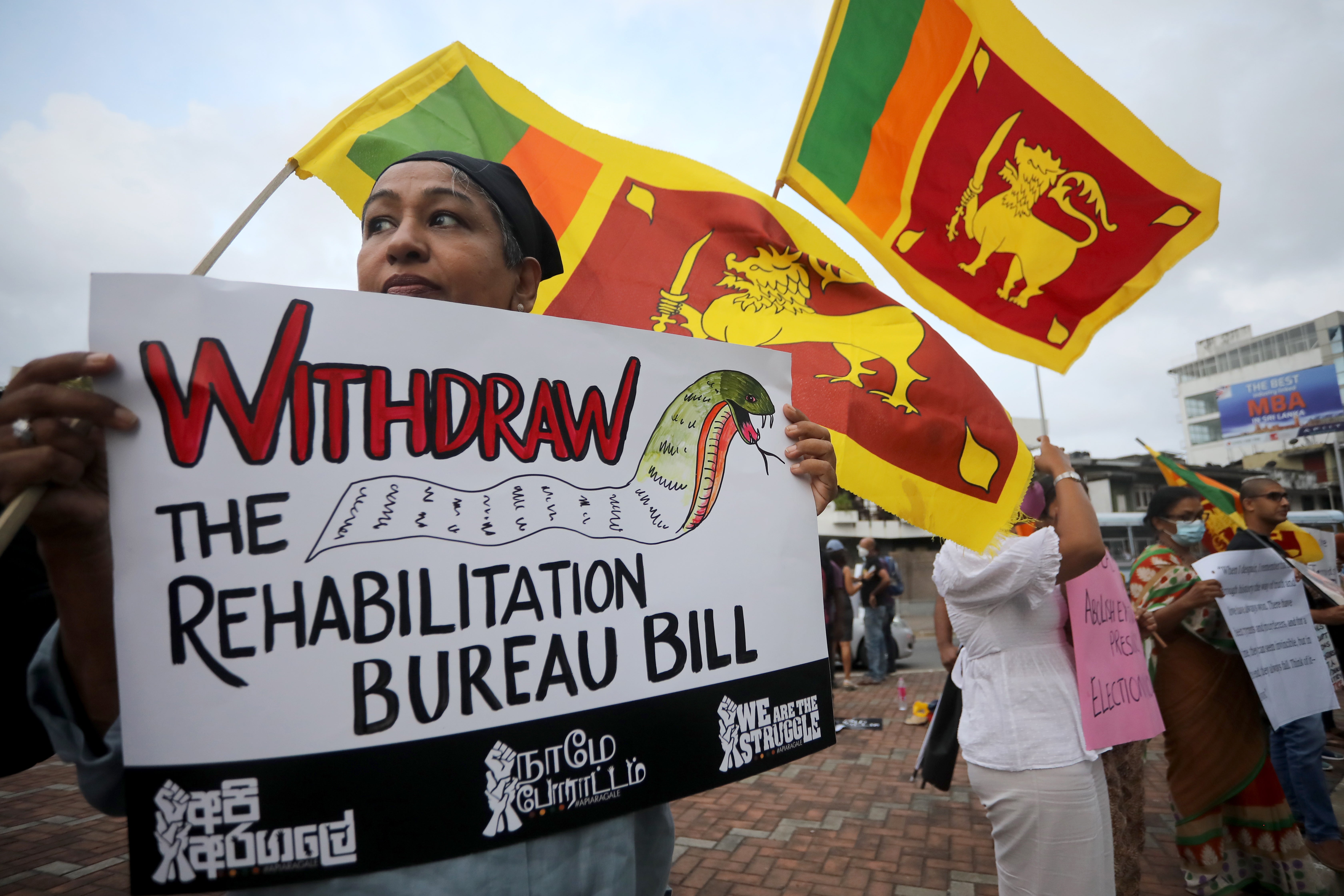Sri Lanka urged to step back from brink of setting up ‘Xinjiang-style’ military-run reeducation centres
Similar measures were used during 26-year bloody civil war in Sri Lanka, activists say

Human rights groups are demanding Sri Lanka withdraw a draft law that would give the government powers to set up military-run “reeducation centres” that have been compared to China’s Uyghur detention centres in Xinjiang.
On Monday, Sri Lanka’s Supreme Court began hearings on six petitions filed by civil society activists and opposition party lawmakers against the Bureau of Rehabilitation Bill, deemed as unconstitutional and arbitrary.
The contentious Bureau of Rehabilitation Bill was released by Ranil Wickremesinghe’s government and was submitted to parliament on 23 September 2022.
The bill will allow the compulsory detention in centres of “drug dependant persons, ex-combatants, members of violent extremist groups and any other group of persons”.
The bill has been strongly condemned by several civil and political activists at home and international rights groups who said it will pave the way for the government’s crackdown on critics and also allow the detention of activists at these camps.
Human Rights Watch (HRW) on Monday said the law will give authorities “broad powers to detain people” in military-run “rehabilitation” centres and place them at risk of abuse.
“The Sri Lankan government’s proposed ‘rehabilitation’ efforts appear to be nothing more than a new form of abusive detention without charge,” said Meenakshi Ganguly, the group’s South Asia director.
Speaking to The Independent, defence and strategic affairs analyst LS Sodhi said “Xinjiang-style” detention centres will create more challenges for Colombo as it can hardly “ill-afford international backlash” while it relies on international aid to emerge from a “financial quagmire”.
“As it reels under an economic catastrophe, these Xinjiang-style detention centres will become an epicentre of human rights violations. Any aid that Sri Lanka is likely to get from any of the international monetary agencies will be vastly hampered when these centres are functional,” Mr Lodhi said.
“Sri Lanka should now focus on a rules-based order and not get entangled in such detention centres as these centres have always resulted in an international embarrassment for the countries they have been opened in, be it in China, Iran or North Korea,” he added.
Thousands of Sri Lankans brought the country to a stand-still earlier this year as they carried out anti-government protests for months amid anger over its spiralling burgeoning economic crisis.
HRW’s former executive, Kenneth Roth, had previously denounced the Sri Lankan government’s “reintegration centres” used after the civil war, saying they were “emboldened by the Chinese government’s mass detention of Uyghur/Turkic Muslims in Xinjiang”.
The country’s worst economic meltdown led to severe shortages of many essential imported items such as medicines, fuel and cooking gas, prompting anger among people.
It spiralled into a political crisis in which thousands of people stormed the official presidential residence in July, forcing then-president Gotabaya Rajapaksa to resign. The protesters also occupied other key government buildings, including the offices of the president and prime minister.
After unprecedented protests dismantled the reign of the powerful Rajapaksa family, the country’s new president, Mr Wickremesinghe, has since cracked down on protesters.
His first action as leader included ousting the protesters and dismantling their tents in the middle of the night.
One of Mr Wickeremesinghe’s own residences was set on fire by protesters when he was serving as the country’s prime minister during the crisis.
“The Rehabilitation Bill would open the door widely to more torture, mistreatment and endless detention,” Ms Ganguly said.
The country had previously used “rehabilitation” centres under the Public Security Ordinance and the Prevention of Terrorism Act (PTA) in the early 1980s.
According to HRW, thousands of people who were identified as members of the defeated separatist Liberation Tigers of Tamil Eelam were taken to the centres following the civil war which ended in 2009.
They were allegedly tortured and subjected to other abuses, including sexual violence, it said.
The new bill seeks to “rehabilitate” members of violent extremist groups despite the culmination of 26 years of civil war, and those who are dependent on drugs.
Join our commenting forum
Join thought-provoking conversations, follow other Independent readers and see their replies
Comments


Bookmark popover
Removed from bookmarks